Queen Liliuokalani: Royal Prisoner Read online
BY NEW YORK TIMES BEST-SELLING AUTHOR
ANN HOOD
For Cousin Gina
GROSSET & DUNLAP
Published by the Penguin Group
Penguin Group (USA) Inc., 375 Hudson Street, New York, New York 10014, USA
Penguin Group (Canada), 90 Eglinton Avenue East, Suite 700, Toronto, Ontario M4P 2Y3, Canada
(a division of Pearson Penguin Canada Inc.)
Penguin Books Ltd, 80 Strand, London WC2R 0RL, England
Penguin Ireland, 25 St Stephen’s Green, Dublin 2, Ireland
(a division of Penguin Books Ltd)
Penguin Group (Australia), 707 Collins Street, Melbourne, Victoria 3008, Australia
(a division of Pearson Australia Group Pty Ltd)
Penguin Books India Pvt Ltd, 11 Community Centre, Panchsheel Park, New Delhi—110 017, India
Penguin Group (NZ), 67 Apollo Drive, Rosedale, Auckland 0632, New Zealand
(a division of Pearson New Zealand Ltd)
Penguin Books (South Africa), Rosebank Office Park, 181 Jan Smuts Avenue, Parktown North 2193, South Africa
Penguin China, B7 Jiaming Center, 27 East Third Ring Road North, Chaoyang District, Beijing 100020, China
Penguin Books Ltd, Registered Offices: 80 Strand, London WC2R 0RL, England
All rights reserved. No part of this book may be reproduced, scanned, or distributed in any printed or electronic form without permission. Please do not participate in or encourage piracy of copyrighted materials in violation of the author’s rights. Purchase only authorized editions.
Text © 2013 by Ann Hood. Illustrations © 2013 by Penguin Group (USA) Inc. Published by Grosset & Dunlap, a division of Penguin Young Readers Group, 345 Hudson Street, New York, New York 10014. GROSSET & DUNLAP is a trademark of Penguin Group (USA) Inc.
Library of Congress Cataloging-in-Publication Data is available.
Illustrations by Denis Zilbur. Map illustration by Giuseppe Castellano.
Design by Giuseppe Castellano.
ISBN: 978-0-698-15943-3
Table of Contents
CHAPTER 1 : Great-Uncle Thorne Reveals Secrets
CHAPTER 2 : Back to Bethune Street
CHAPTER 3 : Lame Demon
CHAPTER 4 : Ali’i Girl
CHAPTER 5 : Liliuokalani
CHAPTER 6 : Restoration Day
CHAPTER 7 : Yellow Feathers
CHAPTER 8 : Mr. Melville to the Rescue
CHAPTER 9 : Prisoners!
CHAPTER 10 : At Sea
CHAPTER 11 : The Shard
Queen Liliuokalani: September 2, 1838–November 11,1917
Herman Melville: August 1, 1819–September 28, 1891
ANN’S FAVOURITE FACTS:
The Teasure Chest
CHAPTER 1
Great-Uncle Thorne Reveals Secrets
Just when Maisie and Felix Robbins thought nothing exciting would ever happen to them again, something exciting happened.
The week of school vacation promised to be muddy (thanks to a steady spring rain) and dull (thanks to Great-Uncle Thorne, who had sealed The Treasure Chest with something impenetrable, or so Maisie believed, since she had tried everything she could think of to get inside).
“Remember when life was thrilling?” Maisie asked Felix with a long, dramatic sigh.
They were sitting in the Library considering their fate: a week with no school, no Treasure Chest, and no mother. Technically, of course, they did have a mother. But with all her time split between work and her boyfriend, Bruce Fishbaum, it didn’t feel like they had a mother.
“We’re practically orphans,” Maisie continued.
“Worse than orphans,” Felix said with his own sigh. “In books, orphans have fascinating lives. Our lives are dull as dirt.”
Recently, Felix had fallen in love with similes, comparisons using like or as. Busy as a bee. Dumb as a post. Happy as a clam. Usually they drove Maisie crazy, but today the two of them were exactly on the same side: bored.
Maisie rolled a marble around on the special hammered-brass table that their great-great-grandfather had brought back from Morocco a million years ago. She’d found the marble under Felix’s bed that morning when she was looking for her lost sneaker. It was blue and milky white and covered in dust. Maybe it will change our luck, Maisie had thought. Like a talisman or good luck charm.
“Why do you suppose this marble was under your bed?” she asked Felix now.
Felix shrugged.
“Maybe it belonged to Samuel,” she said hopefully, pronouncing the duke’s name Sahm-well, the way Great-Uncle Thorne said it.
Felix’s room was called Samuel Dormitorio, named after a Spanish duke who had stayed there for almost three years back when Great-Uncle Thorne and Great-Aunt Maisie were kids. In those days, all sorts of royalty and rich people came to Elm Medona for visits that seemed to never end. Maisie’s room was named after a princess who’d done just that. Princess Annabelle had left her country of Nanuh when her father, the king, was kicked out, and hid at Elm Medona until it was safe for her to go home. No one came to Elm Medona anymore. Unless you counted Great-Uncle Thorne’s ancient girlfriend, Penelope Merriweather.
“Maybe it’s magical,” Maisie said, holding the marble up to the light.
That was when the phone rang. The phones in Elm Medona were all old-fashioned. Some of them looked like boxes and were attached to the wall. They had a big dial in the middle and a funny earpiece that hung from a cord. Whenever Maisie talked on one of those phones, she shouted. She didn’t need to shout; the phones worked just fine. But something about them made her feel that she had to shout to be heard.
Which was why, when she answered this particular call, she shouted, “Hello!”
Her father’s laugh came through the phone. “Hello!” he shouted back.
The sound of her father’s voice always made Maisie feel happy and sad at the same time. He lived practically across the world in Qatar, where he worked for a museum, and she and Felix hadn’t seen him since Christmas.
“Oh, Dad! Life here is so dull!” Maisie shouted.
“Sweetie?” her father said. “Why are we shouting?”
“Oh, it’s this silly old-timey telephone, that’s all.”
“Ah,” he said. “Well, I can hear you just fine.”
Felix had come to stand beside Maisie as soon as he heard their father was on the phone. He kept motioning for Maisie to give him the earpiece so he could hear, too. But Maisie didn’t.
“Guess what?” their father asked.
“You’re here in Newport?” Maisie guessed, even though she knew how ridiculous that was. Still, it always startled her how her father could be so far away and yet sound like he was nearby.
“Close,” he said, surprising her.
“Close?” she repeated, just to be sure she’d heard him correctly.
“He’s here?” Felix said, hopping around in excitement at the idea that their father was in Newport at that very minute.
But Maisie shook her head at Felix.
“I’m in New York,” her father said into Maisie’s ear.
His voice, those most wonderful words—I’m in New York—sounded more wonderful than anything Maisie had ever heard.
“New York?” she said, again just to be sure.
“I am standing on West Eighty-Sixth Street even as we speak,” he said.
Maisie looked at Felix. “He’s on West Eighty-Sixth Street,” she said.
Felix broke into a huge grin.
“And Monday you and Felix are getting on the train and coming here,” her father said.
“And we’re going to New York on Monday!” Maisie said to Felix, shouting again.
“Wahoo!” Felix said.
Wahoo was something his friend Jim Duncan always said, and ordinarily Maisie did not like it. But somehow it seemed perfect right now.
“What did Felix say?” her father was asking her.
“Wahoo!” Maisie said.
That fast, their boring vacation had turned into something marvelous.
Great-Uncle Thorne caught Maisie staring wistfully at the hidden door that led to The Treasure Chest, its seams sealed tight.
“Really,” he said, “staring isn’t going to make it open.”
Maisie turned a steely gaze on Great-Uncle Thorne. “You’re mean,” she said.
“No, I’m not,” he said indignantly. “Selfish, maybe. But not mean.”
They stared at each other for what seemed like a very long time.
“Soon,” Great-Uncle Thorne said softly, “I will be as frail as Penelope. We will sit side by side, staring out at the sea in a fog of old-age bliss.”
“Fine,” Maisie told him. “Waste away. I don’t care.”
She knew that was exactly what would happen if she and Felix couldn’t time travel. Every time they did, Great-Uncle Thorne got healthier and stronger. Who would choose to shrivel up and die, just for love? Love was way too complicated, Maisie decided.
She began to walk back down the hall, but when Great-Uncle Thorne started talking, she paused.
“Besides,” he said—and now he was gazing at the sealed-up door—“you two knuckleheads don’t even use the power right.”
“What do you mean?”
He waved his hands in the air, exasperated. “I mean, you’re not purposeful. You just grab objects all willy-nilly and stumble around.”
“I tried to let the plans for the Holland Tunnel take us to New York, but Felix—” Maisie began.
“Have you even used the anagram?” Great-Uncle Thorne said, ignoring her as usual.
“Elm Medona?” Maisie asked, suddenly interested.
“The anagram!” he bellowed.
“Oh, you mean lame—”
“Silence!” Great-Uncle Thorne said, lifting his jade-tipped walking stick.
“Uh,” Maisie said. “No.”
“What do you do, then, when you’re in a pickle?”
She looked at him, confused.
“A tight spot?” he added. “Danger?”
Maisie thought of the ship fire and the attack on the village in the Great Plains and fleeing to Shanghai.
“We wait,” she said weakly. “I mean, nothing’s going to happen to us—”
At this, Great-Uncle Thorne threw his head back and laughed. Like a hyena, Maisie thought, even though she disliked similes.
“You two ignoramuses actually think you’re invincible?” he said, wiping his eyes. “Because you’re not.”
“We aren’t?” Maisie said, and she actually shuddered, remembering how certain she had been that no matter what happened in the past, they would be safe.
“The anagram can do two things,” Great-Uncle Thorne said, holding up two fingers. “One, it can give you necessary information about the person you meet.” He folded one finger. “And two, it can get you out of danger.” He folded the second finger, and sighed. “Of course, if you overuse it…” He smiled at her, showing his big teeth. “Well, that doesn’t really matter, since you are finished with The Treasure Chest.”
“How do you overuse it?” Maisie asked.
“Irrelevant!” he announced, and continued on his way.
Maisie watched him. His gait was already slower. He kind of shuffled now.
“You probably don’t know about the shard, either,” Great-Uncle Thorne said over his shoulder almost gleefully. “No matter. No matter.”
Instinctively, Maisie’s hand went into her pocket, where she kept the shard from the Ming vase. She rubbed it between her fingers, as if it might reveal its secrets to her.
On Sunday night, Bruce Fishbaum came for dinner. Their mother had worried all day about what to make, and finally settled on pot roast, of all things. Maisie wasn’t sure, but she believed that if a person truly loved another person, she would make something fancy, like duck à l’orange or baked Alaska. She took the pot roast as a good sign of her mother’s feelings toward Bruce Fishbaum.
Great-Uncle Thorne and Penelope Merriweather were eating out that night, which Maisie was grateful for. She did not enjoy watching two people as old as they were making eyes at each other and calling each other pet names like Duckie and Pumpkin.
“Isn’t this cozy?” her mother said, standing back to admire the table, set for four with the Pickworth china and the Pickworth silver and the Pickworth crystal. The gardener had brought in pots of hyacinths, and they stood in a line down the middle of the enormous table, sending out their too-sweet hyacinth scent.
“If you consider a table that seats twenty cozy,” Maisie said, “then yes, this is quite cozy.”
Her mother ignored her. “We’ll have appetizers in the Library, then come in here for dinner. And I was thinking that for fun we’d have dessert in the Cigar Room.”
“We can’t hang around all night,” Maisie said. “We need to pack for our trip to see Dad tomorrow.”
Her mother was fussing with the hyacinths, straightening each stem and rearranging the colors, moving the white and the pink hyacinths, then the pink and the purple.
“You two are being such good sports,” she said.
“Well,” Maisie said, “if we want to be fed, we have to put up with Bruce Fishbaum.”
“Yes, of course,” her mother murmured. “I mean, about Bruce, of course. But about Agatha, too. It shows how well you’re adjusting. And I know how hard this has all been—believe me, I know. But I’m so proud of you both.”
Apparently satisfied with the hyacinths, she looked at Maisie and smiled.
“Agatha?” Maisie said.
“Oh, dear,” her mother said. “Is it Agnes?”
“What are you talking about?” Maisie asked her.
“Your father’s girlfriend, of course. Agatha. Agnes. I promised myself I would remember it, but who in the world is named Agatha or Agnes anymore?”
If her mother noticed the look of anger that was spreading across Maisie’s face, she didn’t say anything about it. Instead, she cocked her head and said, “I hear the doorbell. That must be Bruce.” Then she scurried away, leaving Maisie alone in that overly sweet-smelling room.
Felix thought it was very strange that his mother had made his father’s favorite appetizer for Bruce Fishbaum: artichoke-heart mayonnaise Parmesan-cheese chopped-chilies cheddar-cheese dip. His father made that dip every time they had guests over, and now his mother had made it for Bruce Fishbaum.
“What’s in this?” Bruce Fishbaum practically moaned.
“My secret,” Felix’s mother said. Which was what his father always said when someone asked him that question, because apparently adults did not like to eat gobs of mayonnaise.
“Mayonnaise,” Felix said to Bruce Fishbaum. He could feel his mother glaring at him.
“No wonder it’s so good,” Bruce said, unfazed.
Bruce Fishbaum had on a nautical tie, as usual. This one was green, and looked like it had architectural drawings on it, all lines and squiggles and numbers.
“You ever play hockey?” Bruce asked Felix between bites of dip on slices of French bread.
Felix shook his head. “I’m class president,” he said.
Bruce pointed at him. “You need to get out on the ice,” he said.
“Well,” Felix said, “I ice-skate.”
Technically, that was true. He had ice-skated in his life, though not for some time. In fact, the last time he had ice-skated was in Central Park with his father and Maisie, the winter before the divorce.
“I like ice-skating,” Felix added. Technically, that was true, too. Even though he could think of dozens of things he’d rather do, ice-skating was okay.
“I’ll take you sometime,” Bruce said. “Show you how to hit some pucks.�
��
“Uh-huh,” Felix said, just to be polite.
“Where in the world is your sister?” his mother asked, getting to her feet and looking around, as if Maisie was hiding somewhere in the Library.
“Packing?” Felix offered.
“She was supposed to pack after dinner,” his mother said.
Bruce Fishbaum waved his hand dismissively. “Relax,” he said. “More artichoke-mayonnaise dip for me.”
Then he did something that made Felix practically run out of the room. Bruce Fishbaum took Felix’s mother by the waist and pulled her down onto his lap.
“Oh,” Felix said. He was the one standing now, looking for an exit. “Um…I’ll go find her.”
As quickly as he could, he got out of that room, and bumped right into Maisie in the foyer.
“Mom is sitting on Bruce Fishbaum’s lap,” he blurted.
“Dad is in New York with his girlfriend,” Maisie blurted back.
Maisie and Felix stood staring at each other. They both understood just how dreadful these facts were.
“Her name,” Maisie said, “is Agatha.”
“No one’s name is Agatha,” Felix said.
“Or maybe Agnes.”
“That’s even worse,” Felix said.
Maisie took Felix’s hand.
Although neither of them said anything, each knew what the other was thinking. Just a year ago, they were living happily at 10 Bethune Street with their parents. Every day, their father went off on his bicycle to his studio downtown in Tribeca. Their mother studied for the bar exam. Maisie and Felix happily walked to school together, unaware that in just a short time, nothing would be the same. They stopped at the Bleecker Street playground on their way home, and sometimes their father found them there and the three of them walked the rest of the way together. Didn’t their mother always look happy when they walked in the door, peering at them over her funny half-glasses that she wore for reading? Didn’t their father always kiss her right on the lips? And didn’t they sing together while they made dinner, their father slightly off-key, their mother in her beautiful musical theater voice? How had they gotten from there to here, with a Bruce Fishbaum and an Agatha or Agnes?

 Kitchen Yarns
Kitchen Yarns Waiting to Vanish
Waiting to Vanish Morningstar
Morningstar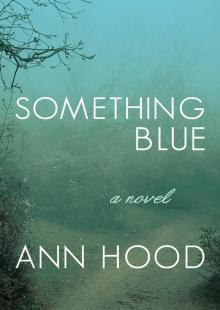 Something Blue
Something Blue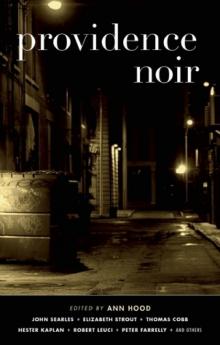 Providence Noir
Providence Noir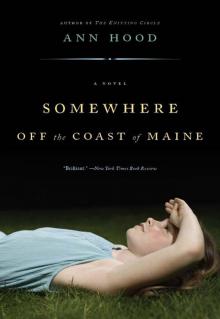 Somewhere Off the Coast of Maine
Somewhere Off the Coast of Maine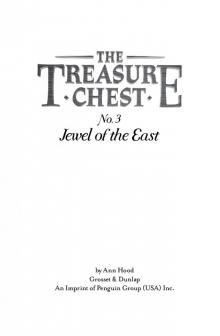 Jewel of the East
Jewel of the East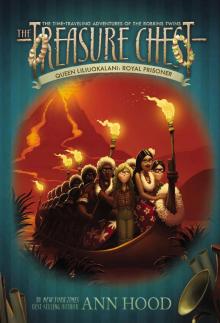 Queen Liliuokalani: Royal Prisoner
Queen Liliuokalani: Royal Prisoner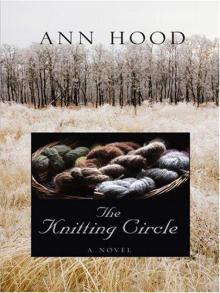 The Knitting Circle
The Knitting Circle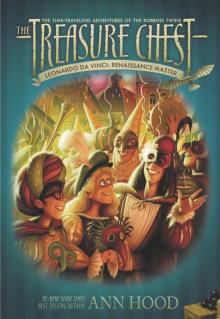 Leonardo da Vinci: Renaissance Master
Leonardo da Vinci: Renaissance Master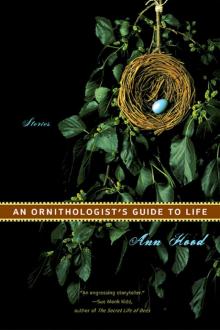 An Ornithologist's Guide to Life
An Ornithologist's Guide to Life The Red Thread
The Red Thread She Loves You (Yeah, Yeah, Yeah)
She Loves You (Yeah, Yeah, Yeah)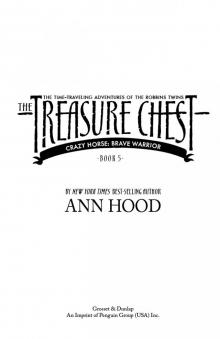 Brave Warrior
Brave Warrior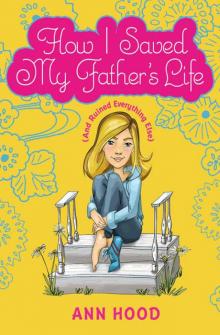 How I Saved My Father's Life (and Ruined Everything Else)
How I Saved My Father's Life (and Ruined Everything Else) An Italian Wife
An Italian Wife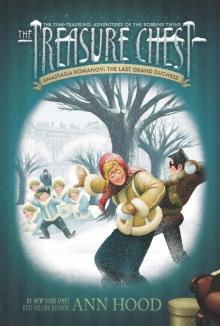 Anastasia Romanov: The Last Grand Duchess #10
Anastasia Romanov: The Last Grand Duchess #10 Prince of Air
Prince of Air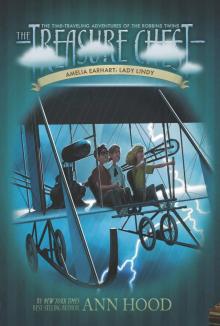 Amelia Earhart: Lady Lindy
Amelia Earhart: Lady Lindy Places to Stay the Night
Places to Stay the Night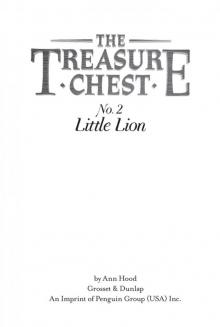 Little Lion
Little Lion Comfort
Comfort Angel of the Battlefield
Angel of the Battlefield